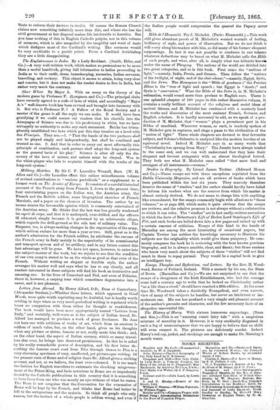Bible de 'Humanite: Par J. Michelet. (Paris: Elamerdd.)—This work still
gives abundant proofs of M. Michelet's wonted warmth of feeling, brilliancy of style, and power of illustration. But we do not think it will carry along'his readers with him, as did many of his former eloquent outpourings. In fact it was not possible to condones in one vehune whatever deductions may be based on what M. Michelet calls the.Bilde of each people, and what, after all, is simply what was hitherto knows under the name of Theogony. The nations of the world are divided into two great categories, and so is this book. First oome the "nations of light,"—namely, India, Persia, and Greece. Then follow the "nations of the twilight, of 'night, and of the clair-obscar,"—natnely, Egypt, Syria, and the Jews. The Rtimayana is the "Bible of goodness ;" the Persian Home is the "tree of light and speech ; but Egypt is "death ;" and Syria is "enervation." What the Bible of the Jews is, in M. Michelet's estimation, would sound more than profane to English ears. There is one splendid .chapter of 100 pages in this rather discursive volume, it contains a really brilliant account of the religious and sodal ideas of ancient Greece, and M. Michelet has condensed with a masterly hand the works and discoveries of the most eminent French, German, and English scholars. It is hardly necessary' to add, as we speak of a pro- duction of M. Michelet, that "woman" plays a prominent part in his Bibles of mankind. Wherever woman, as such, is tenderly spoken of M. Michelet gets in raptures, and sings a pm= to the civilization of the "nation of light." Three whole chapters are devoted to that favourite subject, and Salomo's Sulamite is analyzed like the modern heroine of an equivocal novel. Indeed M. Michelet says in as many words that "Christianity has sprang from Mary." The Jesuits have always tended to the same end, and we can well understand that they hate their eloquent and fervent antagonist with an almost theological hatred. They both use what M. Miohelet once called "that most frail and strongest of all instruments—woman."


































 Previous page
Previous page